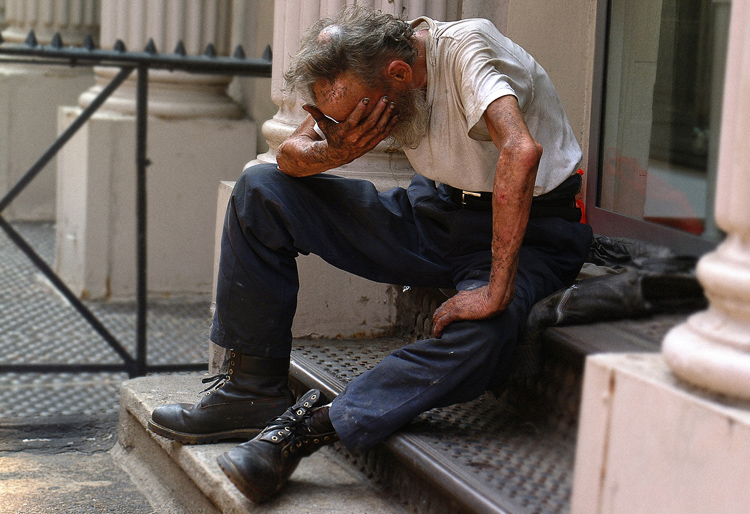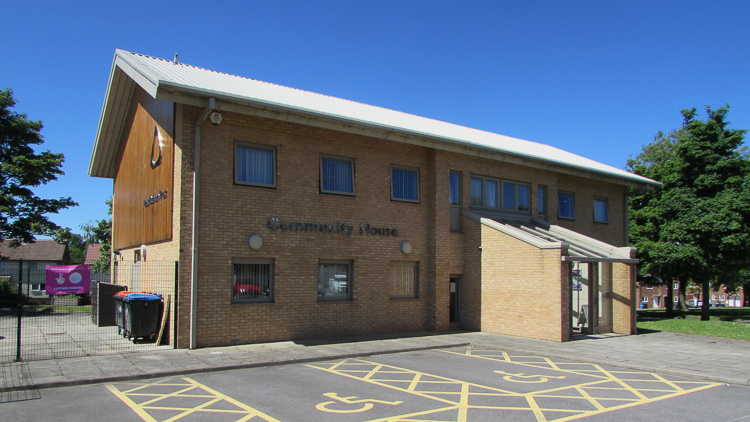This year a UN report on poverty confirmed how austerity measures and universal credit has ravaged the most disadvantaged areas of the UK. For the charity staff working in these communities, what is the reality of the experience, and how do they cope with an onslaught of traumatic stories?
It was a beautiful sunny morning in the North East of England, the sun shone on the rolling green meadows, and the clear blue sky brought about a sense of calm and tranquility. Inside the East Durham Trust (EDT) community centre the staff were cheerful, even with the sombre topic of conversation around the table.
Sitting amongst her fellow staff, and volunteers, Helen Waller described a recent story typical of the growing levels of poverty facing many people in the UK.
“I had a lady in last week with a little girl, she had 10 pence in her purse,” says Helen. “She works part time and I’ve asked do you need a food parcel; she bursts out crying and says `I didn’t realise things had actually got that bad.’ I said if you’ve only got 10 pence what you going to do. A lot of people are like that, ashamed.”
Helen runs the SPIED initiative (Stop Poverty in East Durham), funded by the Big Lottery and just like the other staff at the EDT, she works with people experiencing abject poverty on a daily basis.
“We do have people where we go and see them, and they haven’t eaten,” she says. “We have had people eating straight out the tins, you know it’s shameful that people should have to do that.”

This last year has seen a huge increase in the number of three-day emergency food parcels the center gives out each week. Nationally, The Trussell Trust reported that in the last year its food banks have given out 19% more parcels than the previous year.
In Durham throughout the same year, the EDT has seen an increase from 30-40 parcels a week to 100-120, an increase of 200%. One week they gave out 200 parcels.
Staff at the trust work in the middle of an area that has seen three decades of a downward social and economic spiral. Set in the town of Peterlee, it supports surrounding villages that were once all thriving mining communities. Long since gutted of employment and opportunity, the people remain, and a decade of austerity and more recently universal credit has compounded an already bleak position for many people.
The psychological impact of the work that front line staff do, highlights the dire trend of families in the UK sliding into an intensifying crisis of poverty with only charity funded projects left to help them. Malcom Fallow, Chief Executive of the EDT, is worried. “I wonder sometimes how close to cracking point they are,” he says. “The bit we have to come to terms with is that we are doing what I guess several government departments used to do.”
Without government support, organisations such as the trust are often the last place that people can turn to, and the mental health implications for their workers are a canary in the coal mine that shows the toxic result of poverty as it permeates society.
Since the introduction of austerity measures in 2010, the seven local councils that make up the North East of England have had half a billion pounds less to spend every year. County Durham is among the worst affected areas in the country, with its funding cut by 31% between 2010 and 2017, according to research from Cambridge University.
Alongside this cut to provisions for the North East, the introduction of the universal credit system has led to problems with benefit payments. This has increased the need for community centres such as the EDT to provide essential support services to people, rather than the social and community space they once were.
“I’ve watched the type of work that we do evolve,” says Deputy Manager Lindsey Wood. “People didn’t need food parcels in East Durham ten years ago when I started, there wasn’t a need out there, there was mechanisms in place. You didn’t have to wait six weeks for your first benefit payment from universal credit, that just didn’t happen.”

In postindustrial areas such as East Durham, universal credit has disproportionately affected people working in insecure and unstable positions, such as the ‘no obligation’ of zero hours contracts, or the precarious gig economy roles of Deliveroo and Uber.
More than five million workers across the UK are in low-paid insecure work. As a sign of the fast-changing jobs market one in 10 working-age adults are on gig-economy platforms such as Uber and Deliveroo. This is double the figure of 2016, according to the Trade Union Congress (TUC) and the University of Hertfordshire.
For these workers already struggling to make ends meet, the time spent in between roles and the long waiting period typical of universal credit, can lead to spiraling debt and a deeper hole of poverty to climb from.
“The world of work is changing fast and working people don’t have the protection they need,” says Frances O’Grady, general secretary of the Trades Union Congress. “Huge numbers are being forced to take on casual and insecure platform work, often on top of other jobs.”
The brunt of it is felt by communities with less opportunities, and recent research by the Living Wage Foundation found that the North East, alongside Wales and the West Midlands, experiences the highest levels of low-paid insecure work in the country.
“Simply put, the more disadvantaged people are, the more they’ll be hit by universal credit,” Malcolm says. “The gig economy and zero hours contracts are much more prevalent here.”

This transient nature of employment, or most often underemployment, has created a cycle of in-work poverty for millions in the UK. As more people are affected, and families struggle below the poverty line, Lindsey has noticed that the staff at the trust are coming under an increased strain.
“We had a member of staff who left because by her own admission she couldn’t cope with hearing the stories on a daily basis of people’s problems,” explains Lindsey. “Now this is somebody who was in the army, so she hasn’t lived a sheltered life.
“I know she said she was going home and talking to family trying to get across to them, you don’t realise how privileged you are, and you don’t actually realise what’s happening right under our noses.”
The housing charity Shelter reports that one in three families in the UK now live a single paycheck away from losing their home, and insurer Aviva say that one in four survive with less than £95 in savings.
For staff at the trust, not only do they find the stories they deal with in work traumatic, but there is a growing sense that the reality of struggling as a family in poverty is not far away from where their own lives could be.
“You see somebody on the streets homeless and you don’t know their background,” continued Lindsey. “You don’t assume they’ve always been homeless but if you get what I mean, you don’t really think too deeply into it.
“But when you work with an individual and you have to ask those types of questions about where they’ve been and their background and you find out they actually were somebody who worked, who had a home, who had a family, all those types of things, I think that’s when it becomes a shock because you realise that actually they’re not that far from you.”
This feeling of being personally close to poverty, makes the work the staff do and the stories they hear challenging to deal with. On the front desk Leaona Clarkson had just returned to work at the EDT, and found what affected her was the story of a mother who worked in a bank but had split up with her husband.
“She was trying to pay the bills and look after her three children,” Leaona explained. “She was trying to do that with half the salary, so she was really struggling. She left herself with only £20 for food for two months in a row.”
It was only after the woman had discussed her situation with somebody at a local library that they had mentioned the East Durham Trust, which until then she hadn’t been aware of.
“Her and her husband had always worked full time, they didn’t even know we existed,” said Leaona. “She phoned up in tears because she just didn’t know where else to go.
“It was heartbreaking, that one really stuck with me because before I worked here, I didn’t know it existed, and I think it’s just you’re lucky enough to not know that places like this exist.”
Consistent exposure to traumatic stories is a risk for those in frontline positions. Due to this, Lindsey recently introduced resilience training for staff through the mental health charity Mind, in order to protect their health and wellbeing while aiding their ability to cope with work in the communities.

In the nearby village of Horden, Paula Snowdon has been running the community outreach centre, The Hub House. In a very front-line role, she had noticed the psychological effect of the work, but also how the training had helped her deal with its impact.
“If we’ve had children who’ve come in who haven’t eaten, or a gentleman who was sleeping on a roll of carpet, you just think it shouldn’t be happening, its heartbreaking,” she says. “I go home, and I think how lucky I am compared to what I’ve seen that day.
“There was time before I had the resilience training, I’d wake up in the middle of the night worrying about this person or that person.”
The training centers on the understanding that staff are not responsible for the problems of the people they support. It is the wider socioeconomic pressures that limit their ability to help people.
“One of the biggest things that I’ve found is the reasons why people are in these situations is through no fault of their own,” Paula says. “It can be relationship breakdown or mental health and the situation just deteriorates from there, it makes you realise how quickly things can change and go completely in the direction you don’t want them to go. But you can’t stop it.”
Accepting the reality of the situation is an important step towards providing the most effective way to help it. “We can only provide sometimes a sticking plaster and the issue is too complicated for us to resolve,” Lindsey says. “It’s not within our power to resolve them, we can’t change government policy overnight.
“Ultimately legislation stands as it is, so it’s just how do we enable people to be more resilient so they can deal with some of the problems.”
With a responsibility for the organisation as a whole, Malcolm is one stage removed from the front-line work that leaves his staff so vulnerable to the visceral impact of poverty. He has an eye on the long-term viability of the projects, and the staff under his care.
“There will always be that burnout element, with the stories they’re hearing,” he says, discussing the careful recruitment that goes into putting staff into positions at the EDT. “We recruit with an eye on personal resilience anyway…some people have got the emotional resilience to deal with it.
“It’s understanding the political landscape is what makes this happen, and that it’s not your fault so it’s removing the blame from yourself, you know the ‘I’m going home to my comfortable life’ is sometimes what you get.”
For charity staff that are typically sympathetic and compassionate, a logical approach to their work may be sensible, but possibly hard to put into practice. Even those in management like Malcolm find some stories hard to shake, as he tells the upsetting story of a man with learning difficulties who had recently lost his Mother and was then cut off from electricity in winter.
“I remember once on a Friday night a guy who we’d given a food parcel to lived on the other side of town,” he says. “It was raining so rather than him travelling across town in the rain with his two bags of food I was driving that way, so I took him.
“As I drove him home, I said ‘how have you been keeping yourself warm,’ and he said, sounding quite innovative, ‘what you do is when the suns coming through the window you sleep during the day because if you sleep where the sun hits it keeps you warm,’ and he’d discovered this so he was living a nocturnal lifestyle so that the warmth of the sun as it came through different windows of the house warmed his body.
“I then dropped him off at his house, watched him wander down his little garden path with his two bags of food, and I drive off to my weekend which is going to include a nice warm pub and the match and season tickets and all that goes with it. It’s sometimes a bit difficult to get your head around that, but the staff here deal with those situations every day.”

